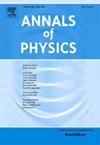施瓦兹柴尔德时空中开放量子系统的非马尔可夫动力学控制
IF 3
3区 物理与天体物理
Q2 PHYSICS, MULTIDISCIPLINARY
引用次数: 0
摘要
通过考虑分别与两个独立储层耦合的两个量子比特,并忽略它们之间的相互作用,在两个模型中研究了两种不同的情况:只有一个量子比特加速并在事件视界附近徘徊,或者两个量子比特都加速并在事件视界附近徘徊。第一个模型是参照阻尼杰恩斯-康明斯模型给出的,其中有一个用洛伦兹谱密度描述的水库。第二个模型是纯去相干模型,其储层由欧姆谱密度描述。我们研究了加速度和霍金温度对双量子比特开放量子系统的非马尔可夫性和量子速度极限时间的影响。通过数值计算发现,对于这两种模型,通过降低量子比特的加速度和事件视界外的霍金温度,可以增强量子系统在施瓦兹柴尔德时空中动态过程的非马尔可夫性,直至接近两个量子比特都处于惯性框架时的非马尔可夫性。然而,我们发现,在第一个模型中,量子态的演化速度会随着加速度和霍金温度的降低而加快。而在第二个模型中,量子态的演化速度会随着加速度和霍金温度的增加而加快。在这两个模型中,马尔可夫动力学系统的量子态演化速度仍然可以加快。本文章由计算机程序翻译,如有差异,请以英文原文为准。
Non-Markovian dynamics control of an open quantum system in a Schwarzschild space–time
By considering two qubits respectively coupled with two independent reservoirs and ignoring the interaction between them, two different cases are studied in two models: only one qubit accelerates and hovers near the event horizon or both two qubits accelerate and hover near the event horizon. The first model is given by referring to the damping Jaynes–Cummings model with a reservoir described by Lorentzian spectral density. And the second model is a pure dephasing model with a reservoir described by Ohmic spectral density. We investigate the impact of acceleration and Hawking temperature on the non-Markovianity and the quantum speed limit time of a two-qubit open quantum system. Through the numerical calculation, it is found that for these two models, by reducing the acceleration of qubits and the Hawking temperature outside the event horizon, the non-Markovianity of the dynamic process of the quantum system in the Schwarzschild space–time can be enhanced until it approaches the non-Markovianity when both qubits are in the inertial frame. However, we find that in the first model, the evolution speed of quantum state can be accelerated with decreasing acceleration and Hawking temperature. While in the second model, the quantum state evolution speed can be accelerated with increasing acceleration and Hawking temperature. For both models, the evolution speed of the quantum state of the system in the Markovian dynamics can still be accelerated.
求助全文
通过发布文献求助,成功后即可免费获取论文全文。
去求助
来源期刊

Annals of Physics
物理-物理:综合
CiteScore
5.30
自引率
3.30%
发文量
211
审稿时长
47 days
期刊介绍:
Annals of Physics presents original work in all areas of basic theoretic physics research. Ideas are developed and fully explored, and thorough treatment is given to first principles and ultimate applications. Annals of Physics emphasizes clarity and intelligibility in the articles it publishes, thus making them as accessible as possible. Readers familiar with recent developments in the field are provided with sufficient detail and background to follow the arguments and understand their significance.
The Editors of the journal cover all fields of theoretical physics. Articles published in the journal are typically longer than 20 pages.
 求助内容:
求助内容: 应助结果提醒方式:
应助结果提醒方式:


